ReWater MENA hosts inception workshop in Cairo
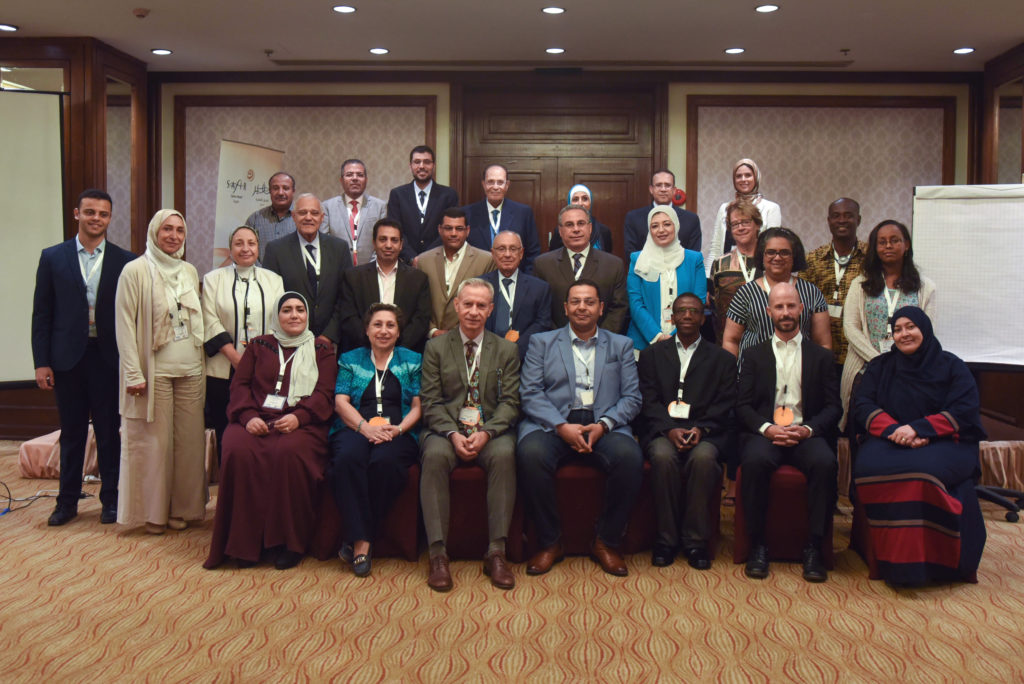
Water scarcity in MENA
The Middle East and North Africa (MENA) is the most water-stressed region in the world. Currently, the average water availability for agriculture, industries and human settlements is 1,200 m—around six times less than the global average. With the demand for water already far surpassing its supply, MENA’s water scarcity will only intensify in the future. In fact, the World Bank predicts that water availability per capita in MENA will be halved by 2050. Decreasing water availability—a cornerstone of sanitation and hygiene and a necessity for quenching thirst and cultivating crops—spells increasing danger for both the region’s social and economic growth and individuals’ health and livelihoods.
One promising solution is the safe reuse of treated water. Rather than view water as a one-time resource that we can use, dispose of and lose, imagine if we could reuse it multiple times with benefits for all. For example, water that has been used in cities could be treated and safely reused in agriculture, rather than letting it evaporate or run into the sea without any productive use. To give water a second life is to reduce water scarcity, increase resilience to climate change and improve people’s livelihoods. Some water treatment and reuse schemes are already in place, with much scope for expansion but also major obstacles to progress.
ReWater MENA
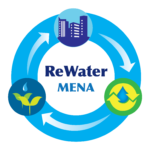
ReWater MENA is a four-year project that will expand the safe reuse of treated water in MENA, with a focus on Egypt, Jordan and Lebanon. Funded by the Swedish International Development Cooperation Agency (Sida) and led by Javier Mateo-Sagasta, a research group leader at the International Water Management Institute (IWMI), ReWater MENA will analyze and address economic, social and technical barriers to reuse in the region and promote safe reuse practices that improve food safety, health and livelihoods. By 2021, the project will produce: 1) a sourcebook with case studies and guidelines about the reuse of treated water, 2) local water reuse plans for six sites in Egypt, Jordan and Lebanon, 3) national strategies for more and safer water reuse in Egypt, Jordan and Lebanon and 4) stronger stakeholder capacity for safe water reuse.
Inception workshop
On September 25-27, 2018, over 30 IWMI researchers and project partners convened at ReWater MENA’s inception workshop in Cairo, thus beginning a flurry of activity and a blizzard of colored paper.
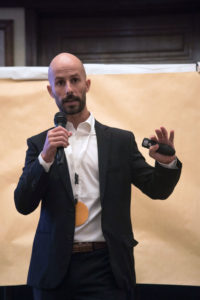
The inception workshop opened with welcoming addresses by Dr. Ahmed Moawad of the Holding Company for Water and Wastewater, Dr. Mahmoud Abu-Zeid of the Arab Water Council and Dr. Ragab Abd Elazeem of the Egyptian Ministry of Water Resources and Irrigation. Mateo-Sagasta then presented ReWater MENA’s objectives, describing the current state of wastewater production and treatment in the Arab World: 15 km3 of municipal wastewater is created each year but only about 25% is actually treated. Mateo-Sagasta also discussed several challenges to expanding the reuse of wastewater—such as distrust of safety, missing or over-stringent regulations and a lack of cost recovery mechanisms—and how the project activities are designed to address them.
“The concept of wastewater treatment and reuse in agriculture is not new in the region,” explains Mateo-Sagasta. “It always looked to be a promising solution to address water scarcity but it never took off at the expected rate. Our project will examine why and will seek to break barriers for more and safer water reuse in MENA.”
With this in mind, participants created a timeline of the project’s milestones at the regional, national and local scales. This not only clarified each organization’s role within the project, but also highlighted the connections between them so partners could see how to best support one another.
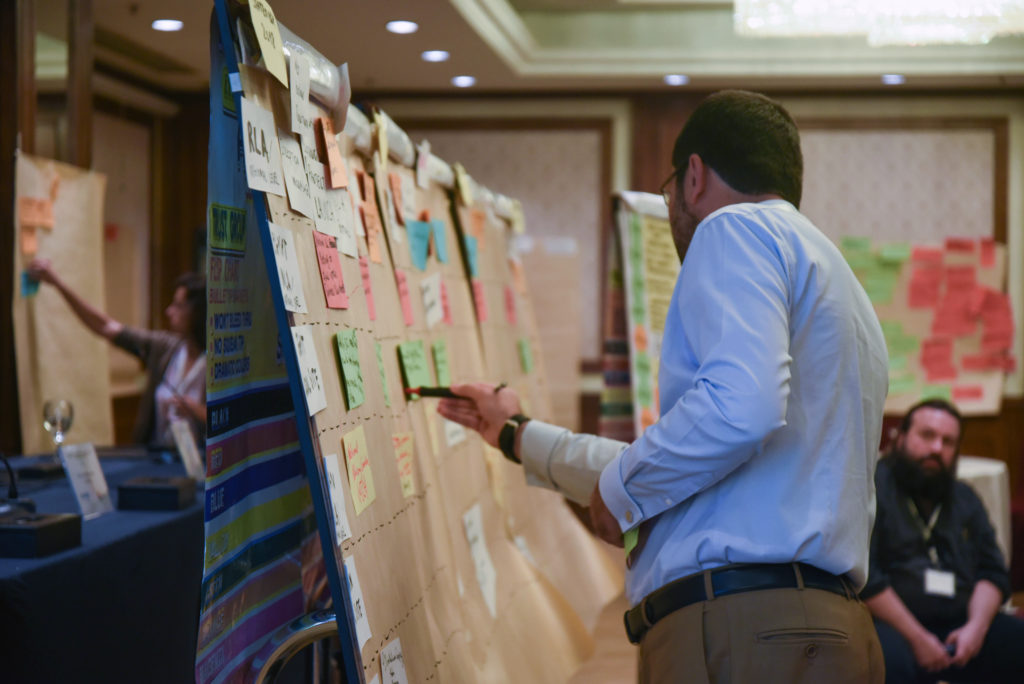
Participatory methods
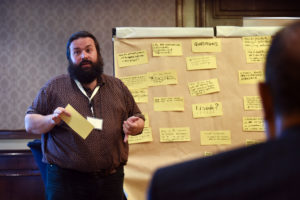
On day two, Jean-Emmanuel Rougier and Aleksandra Dolinska of Lisode guided participants through the project’s participatory approach. Rougier and Dolinska first introduced potential levels of participation, including being informed, giving an opinion (consultation), proposing solutions together (participation) and making decisions together (co-decision). Rather than experts providing solutions and risking users not adopting them, as in the linear model of innovation, Lisode proposes an approach in which experts are one of many sources of knowledge and facilitators of an innovation process.
“The more we involve stakeholders—honestly, not just for communicating—the more impact the project will have,” says Rougier.
Implementing partners began to explore how principles of participation could be applied to their activities, and at which critical points. At the local and national levels, partners resolved to facilitate the participation of all stakeholders, from water users to donors to policy-makers.
Communications strategy
During the afternoon’s session, Ruth Raymond, IWMI communications consultant, introduced ReWater MENA’s draft communication strategy. The strategy is designed to reframe individuals’ perceptions of water reuse, as well as the corresponding incentives, norms, policies and organizations that determine its implementation.
“We need to think about what the project is trying to make true that isn’t true now, who has to do something they’re not doing now, why might they choose to take that action, and how this message can reach them,” urges Raymond.
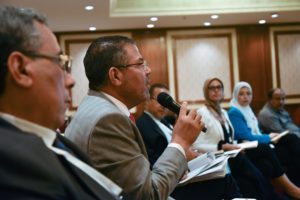
During several activities, participants broke out into groups that represented each target audience: policy-makers, donors, water users, the private sector and the general public. They then developed messages for their target audience and brainstormed tools that could convey their messages to said audience.
Mainstreaming gender
On the final day, Doaa Abdelaal and Everisto Mepedza of IWMI introduced the importance of mainstreaming gender in the project. Because gender was a new term for several participants, Abdelaal explained how it affects power relations, needs and interests and access to and control over resources. She gave a local example of gender imbalance: 3% of agricultural land in Egypt was owned by women in 1999, which increased to only 5.5% in 2005.
“As the roles expected from men and women are changing, it’s about how to change things to make them more sustainable” says Abdelaal.
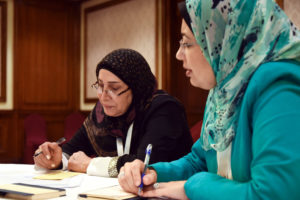
Since women are disproportionately affected by water scarcity, Mepedza emphasized the need for women’s participation in ReWater MENA. Inspired by his phrase “nothing about women without women,” participants worked in groups to identify practical steps to achieve this end, such as the collection of gender disaggregated data, gender-sensitive reuse plans and support for female leadership in training workshops.
Next steps
As the shadow of water scarcity lengthens, the importance of water reuse cannot be understated. Wastewater is the only water resource that will grow in the future, but whether economies and society can make a safe and productive use of this untapped resource depends on the success of projects like ReWater MENA.
“The project can give new life,” says Amgad Elmahdi, head of IWMI’s MENA office. “If water is collected and treated for use, this can close the gap between supply and demand.”
Organizations taking part in the inception workshop were the Arab Countries Water Utilities Association, Arab Water Council, Centre for Environment and Development for the Arab Region and Europe, Food and Agriculture Organization of the United Nations (FAO), Holding Company for Water and Wastewater, International Center for Agricultural Research in the Dry Areas (ICARDA), Lebanese Agricultural Research Institute, Lisode, the Royal Scientific Society of Jordan, Jordan’s Ministry of Water and Irrigation and Egypt’s Ministry of the Environment.
ReWater MENA will be officially launched at Cairo Water Week on October 17, 2018. For more information, please contact Gihan Bayoumi, project manager (G.Bayoumi@cgiar.org).
--------------
You may find photos from ReWater MENA's inception workshop here. You may also download presentations about the project overview, participatory participation (general info and project-specific), communication strategy and gender.
